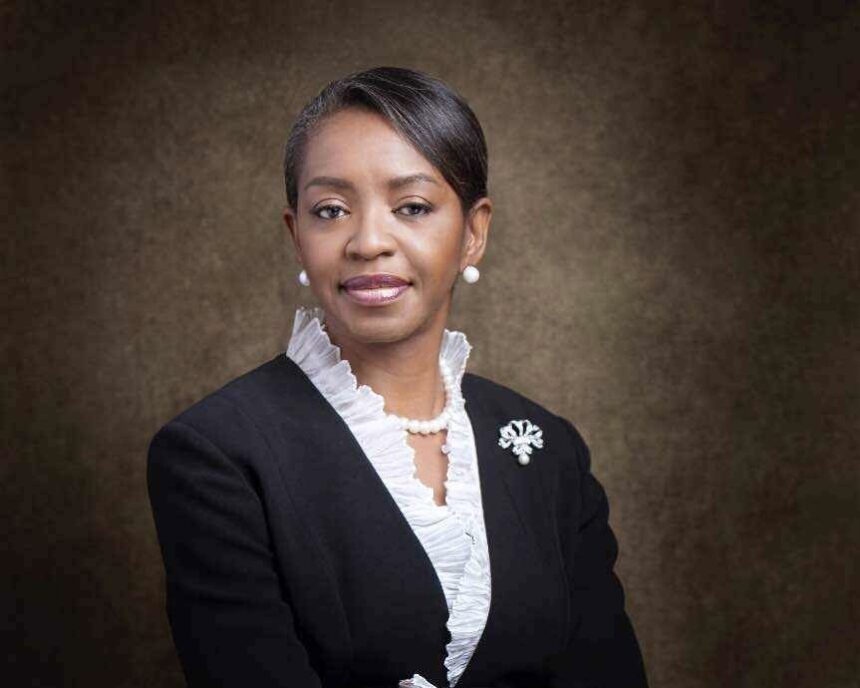Following the exit of Professor Mahmood Yakubu as Chairman of the Independent National Electoral Commission (INEC), May Agbamuche-Mbu assumes leadership of the electoral body at a decisive period for Nigeria’s democracy.
The announcement was made on Tuesday at the INEC headquarters in Abuja during a stakeholders’ meeting with Resident Electoral Commissioners. This comes following the formal handover of duties by Professor Mahmood Yakubu, who is proceeding on a terminal leave.
“In the interim, I am handing over to one of the most senior national commissioners by date of appointment. Following consultation with other national commissioners, May Agbamuche-Mbu will serve in an acting capacity pending the appointment of a substantive chairman of the Commission,” Yakubu said in a statement.
Agbamuche inherits a commission that has made progress in integrating digital tools into Nigeria’s electoral process; from the Bimodal Voter Accreditation System (BVAS) to the INEC Results Viewing Portal (IReV).
The question many are asking now is whether she can strengthen these systems, build institutional capacity, and steer INEC toward a future where technology guarantees, rather than jeopardises, free and fair elections.
Meet Agbamuche
May Agbamuche-Mbu brings a rich blend of legal expertise, public service experience, and institutional knowledge to the job. Born in Kano but originally from Delta State, she earned her Bachelor of Laws (LLB) degree from the University of Ife (now Obafemi Awolowo University) in 1984. She was called to the Nigerian Bar in 1985 and later pursued further education abroad.
Agbamuche holds a Master of Laws (LLM) in Commercial and Corporate Law from Queen Mary and Westfield College, University of London, and is also a qualified Solicitor of the Supreme Court of England and Wales.
Before joining INEC, she served as the Managing Partner at Norfolk Partners, a Lagos-based law. Beyond her legal career, she was the editor of ThisDay Lawyer, a legal pull-out of ThisDay Newspaper, where she worked between 2014 and 2016 through her weekly column “Legal Eagle”.
Her contributions to governance go beyond the courtroom and newsroom. Between 2010 and 2011, she served as the sole solicitor on the Presidential Projects Assessment Committee, which reviewed stalled federal infrastructure projects across the country. In 2016, she was also part of the Ministerial Committee that developed Nigeria’s Road Map for the Solid Minerals Sector.
At INEC, Agbamuche chaired the Legal Services, Clearance and Complaints Committee (LSCCC), an arm of the Commission responsible for candidate clearance, petitions, and legal oversight. Her experience in electoral law and her track record of administrative integrity positioned her to succeed Professor Yakubu as Acting Chairman.
A New Test of Leadership
Agbamuche steps into office at a time when many people say public confidence in INEC is under strain. The 2023 general elections, though hailed as one of the most technologically driven in the nation’s history, were marred by glitches and inconsistent deployment of BVAS and IReV.
Citizens and political observers have since called for reforms that not only expand the use of digital tools but also ensure their reliability and transparency.
As Acting Chair, Agbamuche’s challenge is twofold: to rebuild trust and to prove that technology can strengthen, rather than undermine, Nigeria’s electoral process.
Political experts say her ability to balance technical efficiency with institutional credibility will define her short tenure and possibly influence who emerges as INEC’s next substantive chairman.
Strengthening the Technology Backbone
Analysts say the first test of Agbamuche’s leadership will be how effectively she consolidates INEC’s digital systems. The BVAS device, which was introduced to authenticate voters’ identities and reduce electoral fraud, remains a cornerstone of Nigeria’s voting process.
However, its performance in rural areas, poor connectivity zones, and crowded polling units continues to raise concerns.
Experts believe that her administration could focus on reinforcing the commission’s technical infrastructure, including building a stronger support network for real-time monitoring, upgrading server capacity, and improving device maintenance protocols.
Furthermore, data transparency on the IReV portal could be enhanced through better encryption, live analytics, and decentralised data management.
According to industry leaders, another crucial area is the digital training of ad hoc staff. Many of the challenges experienced during past elections stemmed not from the technology itself, but from inadequate training and operational literacy.
Institutional Reforms and Accountability
Technology alone cannot deliver free and fair elections without accountability. Analysts suggest that Agbamuche’s tenure should also focus on reinforcing INEC’s internal governance structures, ensuring that decisions on logistics, data handling, and results management are transparent and audit-ready.
One reform proposal gaining traction is the creation of an independent technical audit board within INEC to periodically review the performance of election technology. This would not only increase public trust but also provide a continuous feedback loop for improvement.
Moreover, collaboration with telecom operators and data agencies could also help address connectivity challenges that affect the transmission of results from remote polling units. As Acting Chair, observers say Agbamuche could champion these partnerships to make INEC’s systems more resilient.
Building Trust Through Digital Transparency
Beyond infrastructure and reform, experts also say Agbamuche must confront INEC’s greatest challenge; public perception. Technology can only serve its purpose if citizens believe in the integrity of the process.
Observers argue that adopting data integrity systems could be the next frontier for INEC, ensuring that once results are uploaded, they cannot be altered or deleted. While such innovation may not happen overnight, Agbamuche’s stance on transparency and digital accountability will set the tone for future reforms.
May Agbamuche-Mbu’s appointment as Acting INEC Chairman marks both continuity and transition. Her legal background, institutional experience, and familiarity with electoral reform make her well-suited for the role.
Yet, tech analysts say her success will depend on how boldly she embraces technology and how effectively she leads a commission that is often caught between innovation and politics.





